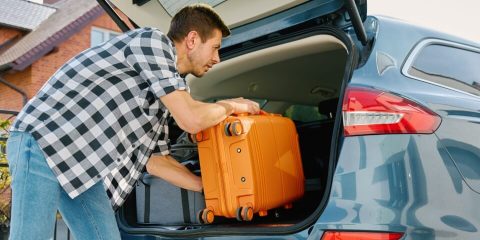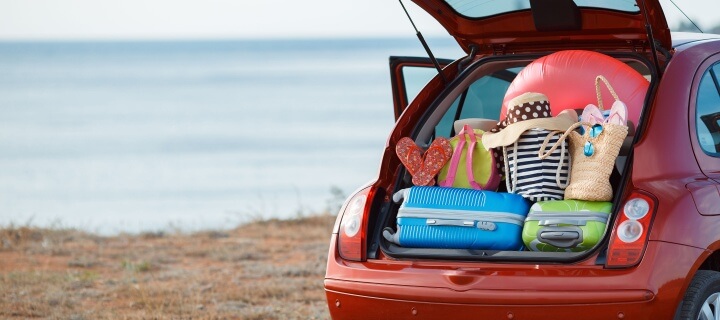What You Can (and Can’t) Bring in Your Vehicle Across the Mexico Border
By Rocio Morales |

Planning a road trip to Mexico? Whether you’re heading to a beach town, visiting family, or just craving the freedom of the open road, driving to Mexico offers an exciting way to explore. But before you pack the car and take off, it’s crucial to understand what you can bring in your vehicle across the Mexico border—and what’s not allowed.
Mexican customs regulations can differ significantly from those in the United States, and even unintentional mistakes can lead to delays, fines, or losing your belongings. From everyday items to agricultural products, there are clear rules about what you can and can’t bring into Mexico.
It’s not just about what’s in your trunk. You’ll also need to be prepared with the right documents. A passport card or valid passport is required, and if you’re traveling beyond the border zone, a temporary import permit is a must. Don’t forget your vehicle registration and Mexican-approved car insurance are also required to legally drive in the country.
This guide covers everything you need to know before crossing the border—including how to choose whether to choose the “Nada que Declarar” (nothing to declare) or “Carril de Declaración” (something to declare) lanes, how to handle secondary inspections, and how to fill out the proper travel documents. With the right preparation, entering Mexico by car can be easy, stress-free, and full of adventure.
Why It Matters
Whether you’re headed to a resort town, visiting family, or just exploring by car, entering Mexico by vehicle comes with specific rules. Unlike domestic travel within the United States, crossing an international border means you’ll need to understand and follow a different set of regulations.
What you bring into Mexico is subject to inspection by customs officials, and it’s your responsibility to know what’s allowed, what must be declared, and what’s outright prohibited. Failing to do so could result in delays, fines, or even criminal penalties.
Personal Allowance: Duty-Free Limits
Mexico allows travelers driving in from the U.S. to bring a limited number of personal items and goods without paying customs duty—but only if they meet certain criteria. These duty-free limits are designed to make travel easier for individuals and families bringing along everyday items for personal use, not for resale or business purposes. Understanding what qualifies under this exemption can help you avoid unnecessary questions or fees at the border.
Standard Items Covered
If your items are for personal use and fall within the allowed value threshold, they can typically be brought in without issue. These include common travel and day-to-day necessities:
- Personal clothing, footwear, and toiletries
- One laptop or tablet
- One camera or video recording device
- Two cell phones
- One pair of binoculars
- Luggage and backpacks
- One musical instrument
- Basic camping, sports, or photography gear
- Up to three pets with documentation
These items must clearly be for personal use—not for resale or commercial activity. When traveling with gifts for family or friends, leave them unwrapped, and bring the original receipt for each gift, and print all receipts for purchases made online.
Monetary Exemption
The import permit exemption limit for land travelers is up to $300 USD worth of goods per person and $500 USD during the vacation periods known as Programa Paisano. Families can combine allowances, so a family of four could bring in up to $1,200 USD in qualifying items.
In addition, you may carry up to $10,000 USD (or its foreign currency equivalent) in cash, checks, or monetary instruments. Amounts over that must be declared to Mexican customs. Not reporting large sums of money could lead to its confiscation and legal action.

Food, Alcohol & Tobacco Rules
Bringing a few road trip snacks? That’s usually fine. But when it comes to perishable goods or alcohol, there are limits. Agricultural products especially are tightly regulated to protect local ecosystems and food supply.
Permitted food and beverage items generally include:
- Commercially packaged, non-perishable snacks
- Bottled water or sodas for personal consumption
- Up to 3 liters of wine or liquor per adult
- Up to 20 packs of cigarettes, 25 cigars, or 200 grams of loose tobacco
Avoid fresh fruit, vegetables, meats, or any homemade or unpackaged food. These items are not allowed and could be confiscated.
When it comes to alcohol and tobacco, only adults over 18 may bring these items and they must be clearly for personal use. Bringing more than the permitted quantity may require paying duties and declaring the goods.
Pets and Wildlife
Yes, you can bring your pet across the Mexican border, but it requires preparation. Mexico allows up to three pets per traveler—usually cats or dogs—with proper paperwork.
Before traveling, make sure you have:
- A veterinary health certificate issued within 15 days of entry
- Vaccination records, including current rabies shots
- Proof the animal is not for resale or breeding
Wild animals, exotic pets, or certain dog breeds may be subject to additional restrictions or may be prohibited entirely. If you plan to bring an animal outside the norm, it’s best to consult the Mexican consulate or a customhouse broker in advance.
Prohibited & Restricted Items
Knowing what not to bring is just as important as knowing what’s allowed. Some items are strictly prohibited under Mexican law, while others require special permits or declarations.
Items that are either restricted or banned include:
- Firearms and ammunition: Do not bring any guns or bullets. Guns are illegal in Mexico without proper authorization and attempting to bring them in can result in imprisonment.
- Illegal drugs: Even trace amounts of controlled substances, including cannabis, can result in arrest.
- Prescription medications: Must be in original packaging with valid prescription documentation.
- Drones and professional camera equipment: These may require permits.
- Used car parts or tires: These may be considered commercial and are often not allowed.
- Hazardous materials: It’s against the law to bring certain hazardous materials into the country without permission from Semarnat, including empty containers that held dangerous substances, unusable electronics, and used car batteries.
- Vapes and e-cigarettes: Mexico has banned the import of vapes or electronic nicotine delivery systems, including cartridges. Do not bring them across the border, even for personal use, as they may be confiscated by customs officials. You can buy them once them, but the selection may be limited.
If you’re ever unsure about an item, the safest course of action is to declare it upon entry.
Value Thresholds and Lanes
When crossing the border (especially for Americans), travelers must choose between two lanes: the green “Nada que declarar” (Nothing to Declare) lane and the red “Declaración” (Declaration) lane. This system helps Mexican customs officials quickly assess which vehicles may require further inspection based on what you’re bringing into the country.
Choosing the right lane isn’t just about following the rules—it can also save you time and stress. Knowing how these lanes work and what qualifies for each can make your border crossing much smoother.
“Nothing to Declare” vs “Declaration” Lane
If all your items are personal and below the value threshold, proceed through the green lane. However, some travelers are randomly selected for secondary inspection via a red light/green light system. If the light flashes red, you must stop for review.
Use the red lane if:
- You exceed the duty-free value
- You are carrying restricted items
- You are unsure about the rules
Using the declaration lane isn’t a penalty—it simply means you’re being transparent. Failing to declare items that require it may lead to:
- Customs duties or fines
- Item confiscation
- Detention or criminal charges
- Vehicle impoundment in serious cases
Penalties for Non-Compliance
Mexican customs law is strict, and attempting to bypass the rules can carry serious consequences—especially if you’re caught with weapons, large sums of undeclared money, or restricted electronics. Travelers who fail to declare required items may face immediate fines and duties. In more severe cases, customs officials have the authority to confiscate goods or even impound your vehicle.
Legal charges and jail time are possible for serious infractions, and repeated violations could result in being flagged for future border crossings. It’s not worth the risk. A little preparation and complete honesty at the border are the best ways to protect yourself and ensure a smooth entry into Mexico.
Final Checklist & Safety Precautions
Crossing into Mexico doesn’t have to be complicated, but you should make sure everything is in order before you hit the road. Here’s a final checklist to help you prepare:
- Valid passport or passport card
- Current vehicle registration and title (or notarized letter if you’re not the owner)
- Temporary vehicle import permit (required beyond the border zone)
- Mexican car insurance (U.S. coverage does not apply in Mexico)
- Health and vaccination records for pets
- A complete list of valuables and receipts, if necessary
- Items organized and packed for easy inspection
- An understanding of customs rules and which lane to choose
Be patient, courteous, and cooperative with customs officials. They’re simply doing their job, and respectful travelers often experience fewer issues.
Be Prepared for Your Border Crossing—Get Insured and Informed Before You Drive!
Before driving to Mexico, double-check that you have your passport card, vehicle registration, and required Mexican-approved car insurance. U.S. policies won’t cover you once you cross the border.
At Sanborn’s Insurance, we make it easy to get the coverage you need. We’ve been helping people drive into Mexico for more than 75 years. Call us at 800‑222‑0158, request a free quote online, or stop by one of our convenient locations or kiosks at the border.

